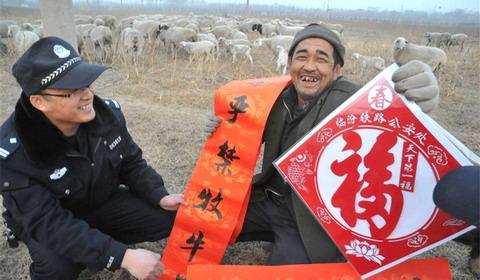Toward food secure China
Updated: 2014-01-21 07:44
By Shenggen Fan (China Daily)
|
||||||||
To ensure that food security is achieved efficiently, China has to adopt a comprehensive approach, which goes beyond securing food supply to include social protection for disadvantaged groups.
Moreover, agriculture must be treated as a business to boost food production. Funds for agricultural research and development, farmers' education and rural infrastructure should continue to receive high priority. To add value to agriculture, a supply chain, from production to processing and marketing , should be built and supported. More importantly, a mechanism should be established to ensure that small farmers benefit from the value addition.
This is the time for China to introduce land policy reforms in the agriculture sector. In particular, farmers should be encouraged to expand their farm size by allowing them to rent land or lease land-use rights. This will enable them to secure more arable land. Also, well-targeted social safety net programs should be put in place to protect rural migrants in cities who have chosen to give up their farmland but have not found a means of livelihood.
This is also the time to phase out agricultural subsidies, because they encourage inefficient use of agricultural inputs such as water and inorganic fertilizers. Increased agricultural production should not come at the expense of environmental sustainability and food safety. Recent efforts to keep up with the growing demand for food have, to a certain extent, compromised food safety because of the use of potentially hazardous inputs and production methods.
Sound regulation and regular monitoring of the entire food supply chain are critical to food safety. Small farmers and other value chain actors should be supported to meet food safety standards through, for example, information and training on safe production and processing methods.
The impact of unsafe food goes beyond the potentially detrimental effect on consumers' health. The loss of consumer confidence in China can suddenly shift preferences toward foreign-made food products. This will certainly hurt the domestic market and can potentially destabilize the international food market as it struggles to meet an abrupt jump in demand.
Apart from improving national food security, China also has the opportunity to enhance global food security. It could do that, for example, by diversifying its food imports from African and Latin American markets by investing in those regions. This will lead to win-win outcomes, because it would ensure a more stable supply of food for China as well as grant those regions access to the Chinese food market.
A comprehensive policy agenda will help China to achieve food security, and the country's new leadership will have a critical role to play in advancing that agenda.
The author is director general of International Food Policy Research Institute.

 Commemorations held to honor Martin Luther King Jr.
Commemorations held to honor Martin Luther King Jr.
 Thrillseeker enjoys the hammock in the sky
Thrillseeker enjoys the hammock in the sky
 Babies baptised during a mass ceremony
Babies baptised during a mass ceremony
 Winter cultural festival opens in Xinjiang
Winter cultural festival opens in Xinjiang
 Air travel to Taiwan continues to take off
Air travel to Taiwan continues to take off
 Panda cub in Washington makes her public debut
Panda cub in Washington makes her public debut
 Spring Festival preparations across China
Spring Festival preparations across China
 Premier vows to help startups
Premier vows to help startups
Most Viewed
Editor's Picks

|

|

|

|

|

|
Today's Top News
US commemorates Martin Luther King Jr.
Human spread of H7N9 'sporadic'
US diplomats off to 'quench fire'
Dropping 'no-war' pledge a part of Abe's strategy
Gang busted for illegal gender selection testing
China software to rival Android, iOS
Xi writes to Chinese in German
Premier vows to help startups
US Weekly

|

|






